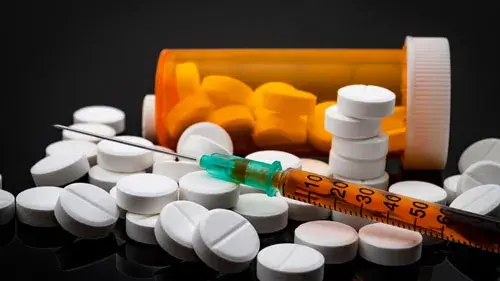 The opioid epidemic is devastating too many American communities. At the Department of Homeland Security, we are working with our partners here and overseas to stop the flow of illicit opioids at the source and interdicting narcotics before they reach our borders. We also focus on dismantling and destroying transnational criminal organizations, which smuggle illicit drugs across our borders and into our hometowns.
The opioid epidemic is devastating too many American communities. At the Department of Homeland Security, we are working with our partners here and overseas to stop the flow of illicit opioids at the source and interdicting narcotics before they reach our borders. We also focus on dismantling and destroying transnational criminal organizations, which smuggle illicit drugs across our borders and into our hometowns.
DHS works with interagency and international partners on a comprehensive approach to attacking the opioid epidemic. These efforts include the U.S. Coast Guard patrolling the South Pacific Ocean and the Caribbean Sea to interdict illicit narcotics before they reach our shores. U.S. Customs and Border Protection (CBP) works diligently to detect and apprehend persons seeking to cross our borders illegally – many of whom are smuggling illicit opioids and opioid analogues. U.S. Immigration and Customs Enforcement (ICE) Homeland Security Investigations also conducts investigative and intelligence related efforts to drive a counter network approach to disrupt and dismantle the transnational criminal organizations responsible for smuggling illicit drugs across our border and distributing them to a vast U.S. drug market that results in the poisoning and killing of Americans.
U.S. Customs and Border Protection (CBP) continues to take action against illicit fentanyl shipped to the U.S. through the mail. CBP operates within major international mail facilities, inspecting international mail and parcels arriving from more than 180 countries. Additionally, CBP and the U.S. Postal Service are working to increase the amount of advance information we receive on international mail. This advance information enables ICE and other agencies to identify networks of foreign suppliers and domestic importers that are responsible for smuggling fentanyl into the United States. These networks have been targeted for investigation and prosecution.
While DHS focuses primarily on supply reduction, we recognize that demand reduction is a critical element in the U.S. government’s comprehensive efforts to combat opioid abuse.
Press Releases & Fact Sheets
- April, 1, 2021: Biden-Harris Administration Announces First-Year Drug Policy Priorities | WhiteHouse.gov
- March 4, 2021: STOP Act Regulations to Fight Opioid Smuggling to be Published
- December 12, 2019: Prize Winners Announced in $1.55M Challenge for New Solutions to Detect Opioids in International Mail
- July 8, 2019: Acting Secretary McAleenan Travels to West Virginia to Discuss DHS Efforts to Combat the Opioid Crisis
- June 11, 2019: 8 Finalists Announced in $1.55m Challenge for New Solutions to Detect Opioids in International Mail
- April 24, 2019: McAleenan: Through Innovation, Partnership and Prevention, DHS is Confronting the Opioid Epidemic and Halting Illicit Substances at the Source
- April 24, 2019: Fact Sheet: Confronting the Opioid Crisis
- June 19, 2018: DHS Officials Discuss Efforts to Combat the Opioid Crisis
- October 26, 2017: Acting Secretary Duke Statement on President Trump Taking Action Against the Opioid Crisis
Testimony
- January 25, 2018: Testimony of CBP Office of Field Operations Executive Assistant Commissioner Todd Owen for a Senate Committee on Homeland Security, hearing “Combatting the Opioid Crisis: Exploiting Vulnerabilities in International Mail Security”
- January 18, 2018: Testimony of ICE Homeland Security Investigations International Operations Assistant Director Raymond Villanueva for a House Homeland hearing “Combating Transnational Gangs Through Information Sharing”
- May 25, 2017: Testimony of CBP Acting Executive Assistant Commissioner for Operations Support Robert Perez for a Senate Committee on Homeland Security hearing “Stopping the Shipment of Synthetic Opioids: Oversight of U.S. Strategy to Combat Illicit Drugs”
- March 21, 2017: Testimony of ICE Homeland Security Investigations Assistant Director for Investigations Matt Allen for a House Committee on Energy and Commerce, hearing “Fentanyl: The Next Wave of the Opioid Crisis”
